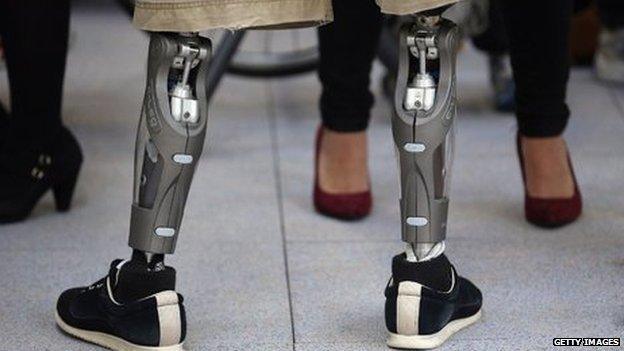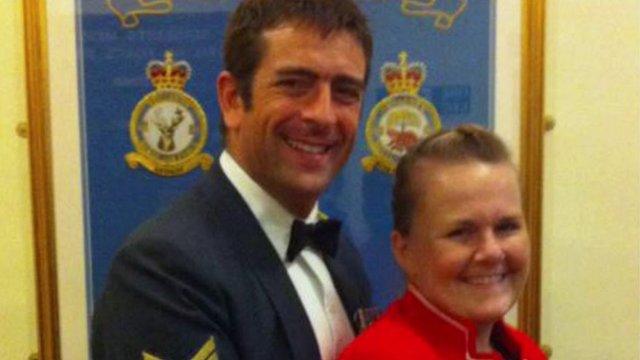Injured veterans 'face delays over compensation claims'
- Published

The Ministry of Defence has said it is aware of serious delays in dealing with compensation claims for injured armed forces veterans.
It said delays were down to a rising number of cases and because there were fewer staff dealing with the claims.
One veterans' group said waiting times for claimants had increased from 82 days in 2010 to 219 days in 2014.
But Veterans UK, which processes claims and administers compensation, disputed this, saying the service was improving.
A letter from Defence Minister Anna Soubry, which has been seen by the BBC, revealed the MoD was aware of the backlog.
The letter said staff at Veterans UK were under pressure, and the MoD has acknowledged this was due to the high number of cases and because of changes to the compensation scheme.
'Form of torture'
MoD figures show there were 36,000 new compensation claims for those injured, disabled or bereaved through service in 2013-14 - an increase of around 16% from 2010-11.
Alex Ford, 44, a former sergeant who was in the Royal Air Force for 25 years, said the delay in his case had been "like a little form a torture".
Former Royal Air Force Sgt Alex Ford said his wait for compensation was "a little form of torture"
He left the RAF after taking redundancy in December 2012, having previously suffered a slipped disc, to care for his wife who suffered back injuries whilst serving as a staff sergeant.
He was also diagnosed with depression six months after returning from Afghanistan and said he did not receive compensation until May this year.
He said: "It adds to the whole mental anguish of it, you literally have no timescale.
"You don't know when the case is going to be resolved and you're left wondering about the postman each day."

Lance Corporal Chris Yates, Royal Engineers
In June 2011, after a truck tailgate gave way and fell upon me, I suffered prolapsed discs, a paralysed bladder, severe kidney damage and mental side effects such as depression.
I first applied for compensation in early 2012, but it took until 24 February 2013 to be awarded an interim payment of £3,000.
I was told by Veterans UK they would review my case again a year on, but when I rang in February 2014 they told me to phone back in a few weeks - which kept on happening until June.
The last time I phoned them I was told my claim had been passed on to a case worker, but it's now just in another queue.
They said it might be weeks before I hear anything as they're completely snowed under with thousands of backlogged cases.
I was medically discharged in April 2014, so this is my pension that hasn't been sorted. All my income has stopped and I'm not able to work.

The National Gulf Veterans and Families Association has data that suggests the average waiting time for claims has increased from 82 days in 2010 to 219 days in 2014.
But Jon Parkin, head of Veterans UK, which works within the MoD, challenged the figures.
"The average wait to get an answer [from the time the claim is submitted] is currently about four months," he said.
"That's a good standard of service, and it's improving.
"We are committed to dealing with all claims as quickly as possible... but of course some claims do take longer than others."
'Can't move on'
Laura Fermour, a troop commander with the Royal Logistic Corps, said the claim she filed for an injury sustained during a military fundraising exercise in April 2013 was still being processed.
Ms Fermour said: "There's just no understanding of the fact that them taking so long to process our claims actually has a massive impact.
"You can't move on with your life until this is sorted."
This has led many of those affected, including Ms Fermour, to call for an independent inquiry.
In the letter seen by the BBC, Ms Soubry wrote: "Please be assured that I am fully aware of the pressures my officials at Veterans UK... are under in administering the War Pensions Scheme."
The government said the 12,000 redundancies made in the armed forces since 2011, as well as the "rising claiming culture", had led to more people putting forward cases. Veterans dismissed this, saying the claims reflected a genuine need.
The government also said the Boyce review that evaluated the process for military compensation, external in 2010, was partly responsible as it had diverted resources.
But Lord Boyce said it was difficult to envisage how a review carried out several years ago had resulted in the current delays.
An MoD press officer said: "There have been delays because staffing levels have been reduced. Despite that productivity has gone up.
"More people have been coming through making claims because of the Boyce review and armed forces redundancies. But we have to look at claims on a case-by-case basis because sometimes they can be complex. We understand we need to improve our communications with veterans and this is something we're working on."
'Offensive'
Madeleine Moon, an MP who sits on the defence select committee, said it was "offensive" for the government to talk about a "claiming culture" being responsible for the backlog.
She said: "If people are injured, if people's lives are changed that dramatically that they need financial compensation to be able to deal with the day-to-day grind of living with an injury, they should have the financial help that we as a nation have covenanted to provide."
Britain's duty of care to its armed forces began as an unspoken pact between society and the military and was formally codified as a covenant in 2000.
- Published6 August 2014
